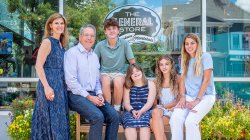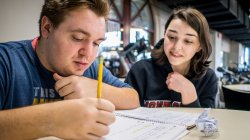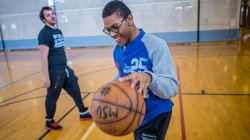Building an Inclusive Campus
Funding from Montclair’s Lacey family will expand educational opportunities for students with disabilities
Posted in: Homepage News, University

When Wendy Lacey opened Cornerstone Montclair to provide opportunities for people with disabilities to be active in their community alongside their peers, its location across from the Buzz Aldrin Middle School was by design. On Friday afternoons (pre-pandemic), “500 students would stream out and many would come buy penny candy at The General Store,” she says.
It’s not that those pennies added up to profits. It was all about changing perceptions, Wendy Lacey says. “Those middle schoolers come in and see people of all different abilities working here.”
That message, strengthening the idea of opportunity and inclusion in the community, is at the heart of Cornerstone, and now, thanks to a generous grant from the Lacey Family Inclusive Education Fund, has led to a partnership with Montclair State University to expand the educational opportunities for students with disabilities on the Montclair State campus.
The family has donated $250,000 to the University’s Increasing Access to College (IAC) project to establish the University’s first comprehensive transition program and college certificate for adults with intellectual or developmental disabilities.
The project was started six years ago by Associate Professor Jessica Bacon and Professor Susan Baglieri, project coordinators and faculty members in the Department of Teaching and Learning. The idea was to promote the inclusion of people with disabilities in all aspects of college life, partnering them with students studying for their teaching certification and those performing services through the Center for Community Engagement.
“What sets our work apart from other universities is the level and focus on inclusivity and inclusion,” Bacon says. While other postsecondary programs for students with intellectual disabilities provide peer support models, they’re not all fully integrated into the systems of campus. “We’ve worked hard to have that kind of vision of inclusion be our core value and our core focus.”
Lacey Family Inclusive Education Fund
As strong advocates for inclusive education for children with special needs, Wendy and Andrew Lacey and their four children – Paige, Evelyn, Abigail and Derek – are active in the Montclair community.
Their family business, Cornerstone Montclair, is both a philosophy and a physical space. At its core the mission of Cornerstone Montclair is about people of all abilities contributing to and feeling welcome in their community. It’s a multipurpose building that has a lot of activities for everyone, but goes out of its way to make sure everyone includes people with disabilities.
On the sports fields, Andrew Lacey and the children are involved with TOPSoccer (The Outreach Program for Soccer) for children with special needs. At Montclair State, Wendy Lacey is a member of the advisory board to the College of Education and Human Services.
“It does not surprise me that the Lacey family has committed to a transformational gift that will impact the future of inclusive education at Montclair State. To the inclusive community, they are an inspiration,” says Yanira Amadeo, director of Development for the College of Education and Human Services.
“We have put time and effort and work into thinking about inclusion outside of the school system and the challenges of transitioning into local communities.” Wendy Lacey says. “It has a lot to do with Evelyn [a rising high school junior who has Down Syndrome] and what we hope happens in her life. Our eyes have been opened to the value that people with disabilities add to their community, and to what’s important in helping them to have a fulfilling life.”
Evelyn Lacey has benefited by learning with her peer group, in the community where she lives and where her siblings go to school. She’s attended public schools and, as a preschooler, the Ben Samuels Children’s Center at Montclair State, which provides inclusive early childhood education.
“As she has grown into a lovely young woman, we have become more involved in disability rights and the disability awareness community,” Wendy Lacey says. “It becomes painfully clear that even if you have great success in an inclusive education setting, once you hit the age of 21 and you age out of that structured environment, for many people, it’s like falling off a cliff. It’s very difficult to find your way in life without the same kind of support you got when you were in school.”

Increasing Access to College Project
Seeing a need, Montclair State began a partnership first with the Education, Careers & Lifelong Community PRIDE program in Chatham to bring students enrolled in the day program for adults with disabilities to campus twice weekly. Students in the Bloomfield High School Vocational Education and Special Training program followed a year later.
To date, 163 student peer volunteers have assisted 59 students with disabilities in their classes and activities, the IAC providing an orientation to campus and college life, exploration of interests and goals, individualized planning and instruction in using personal technologies. The new certificate program will include a vocational component providing internships.
“Having it be a certificate status program also means that it opens up some avenues for financing education that makes it more accessible for a lot more people,” Andrew Lacey says. “Montclair State will be able to build the infrastructure to get the word out about the program and make it available to a much broader population.”

Project Thrives with Peer Support
“The program is consistent with Montclair State’s commitment to equity, social justice and inclusion,” says Tamara Lucas, former dean of the College of Education and Human Services who supported the program from its inception.
“We are interested in opening up all the resources the campus has to offer to as many people in the community as possible,” Baglieri says. “For us, we see it very much as broadening how our campus is engaged with our whole community. We believe our students benefit from having increased disability diversity on campus.”
That’s been the experience of Allyn Lilien ’21, a future teacher on the five-year track to earn her bachelor’s degree and Master of Arts in Teaching with teacher certifications in Math and Teacher of Students with Disabilities.
As a peer volunteer, she has helped students with disabilities navigate the academic and social aspects of campus life. “One of the biggest aspects of the IAC is to create an environment where people with and without disabilities are meeting each other and learning about each other,” Lilien says.
This past academic year, due to the coronavirus pandemic, classes and activities were held remotely with daily peer online sessions run by graduate students and undergraduate Bonner Leader Program volunteers.
“I was inspired by many of the students to try new things and take risks,” says Mariana Luna-Martinez, a rising sophomore Biology major, who came to be a mentor remotely through the Bonner Leader program. “We shared what we have been learning. I presented on a day in my life as a Biology major. I showed pictures of things I was looking at under the microscope and we played games online for socialized events.”
Antonio Reyes, a former Bloomfield High School student, shared his experience in a photo essay published by TASH, a disability advocacy group. “At first when I got there, I felt nervous,” Reyes said. “But then I got to take a class, and that felt good for me. It was also good to meet other students like Trish [his peer volunteer] and meet new friends. Meeting other students was good, because they had already been to college and knew more about college than I did.”
These types of experiences are being gathered and have been published by Bacon and Baglieri as part of their academic research that shares the voices and perspectives of the students involved in the Increasing Access to College project.
The Lacey family notes the methodical research in making the gift. “One of the things that really was a sell for us is the confidence we have in the impact it will have,” Wendy Lacey says. “We have a lot of confidence that this gift is going to help take IAC to the next level.”
Story by Staff Writer Marilyn Joyce Lehren
You May Also Like:
